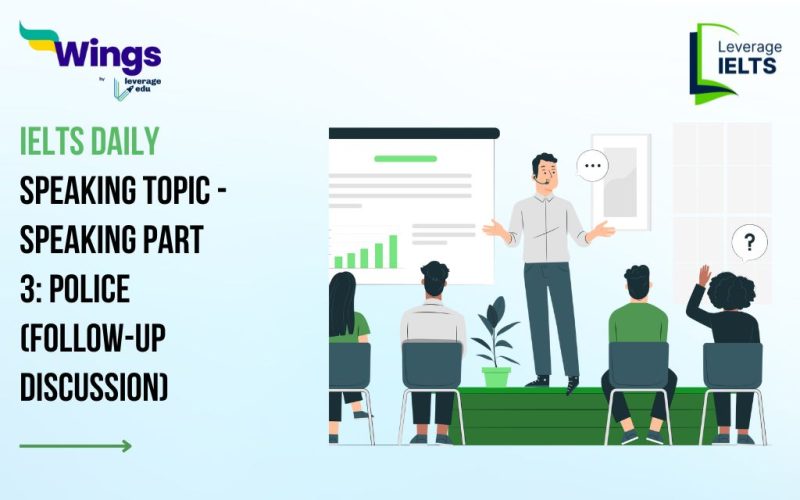Discussion Topics
- Community Policing
- Police Training
- Technology in Policing
Follow-up questions
1. Community Policing
Q.1. What is community policing?
Ans: Community policing, I think, is when police and communities work closely together to keep our neighbourhoods safe. Instead of just responding to crimes, police officers build relationships with us in the community. They listen to our concerns, and I feel like they work together with us to solve problems. This can involve things like neighbourhood watch programs and meetings where we all can talk about how to make our area safer. The idea is to create trust and teamwork between the police and the people they serve, making our communities stronger and safer for everyone. For example, quite recently officers in our area collaborated with local schools and helped in implementing the drug awareness program.
Q.2. Do you believe that community policing is effective in preventing crime?
Ans: I believe community policing is effective in preventing crime because it creates a strong partnership between the police and us, the community. This partnership improves communication and cooperation, which helps us identify potential problems before they turn into serious crimes. For example, when we have a good relationship with the police, we feel comfortable reporting anything suspicious happening in our neighbourhood. Plus, instead of just reacting to crimes, police officers can work with us to address the root causes. For instance, if graffiti is a problem, we could work together on a clean-up or educate others about its consequences, making our community safer together.
2. Police Training
Q.1 How important is proper training for police officers?
Ans: Certainly, proper training is deemed essential for effective policing. For instance, when a new police officer faces a challenging domestic dispute without enough training, they might unintentionally make things worse. However, with thorough training, officers learn conflict resolution and how to handle situations delicately, keeping everyone safe. Training covers everything from laws to communication skills, giving officers the tools they need to serve and protect their community well.
Q.2. What impact does training have on the performance of police officers?
Ans: Training affects how well an officer does their job. It’s like comparing a rehearsed play to making things up as you go along. For example, in a burglary, a well-trained officer knows what to do – securing the scene, gathering evidence, and talking to witnesses nicely to get the important stuff. But without proper training, officers might miss important details, mess up evidence, or not talk to witnesses properly. This could mean a slower response or even no justice at all for the victim.
3. Technology in Policing
Q.1. What role does technology play in modern policing?
Ans. I think technology is a big deal in modern policing. Take body cameras, for instance. Officers wear these while they’re on duty, recording everything that goes down. It’s handy for keeping things transparent and holding everyone accountable since it gives an unbiased record of what happens during interactions with the public. Plus, cops use all sorts of databases and systems to get important info fast – like checking a person’s criminal record or getting warrants sorted out in a jiffy.
Q.2. Can you give examples of how technology is used in law enforcement?
Ans: There are many such instances where technology plays a crucial role in modern policing. For instance, drones are now utilized for surveillance, crowd monitoring, and in situations too dangerous for officers to be physically present. They offer real-time video feeds and capture high-resolution images of the scene. Moreover, predictive policing algorithms analyze past crime data to anticipate potential criminal activities before they happen. It’s like having a crystal ball for crime!
Are you preparing for IELTS? Check out this video to improve your speaking skills for the IELTS exam given below👇.
| Related Blogs | ||
| IELTS Eligibility: IELTS Exam Age Limit & Qualification | IELTS Exam Dates, Registration, Result, Preparation | IELTS Sample Tests: PDF (Download), Exam Pattern |
| IELTS Marking Scheme | IELTS Scoring System & Grading | IELTS Test Centres in India | IELTS Syllabus & Section-Wise Exam Pattern |
Download the Leverage IELTS App today.


Need help to prepare for IELTS? Check out the best IELTS preparation courses in the market offered in a live training environment by trusted educators in a live training environment. If you want help studying abroad, call 1800-572-130.


 One app for all your study abroad needs
One app for all your study abroad needs












 60,000+ students trusted us with their dreams. Take the first step today!
60,000+ students trusted us with their dreams. Take the first step today!